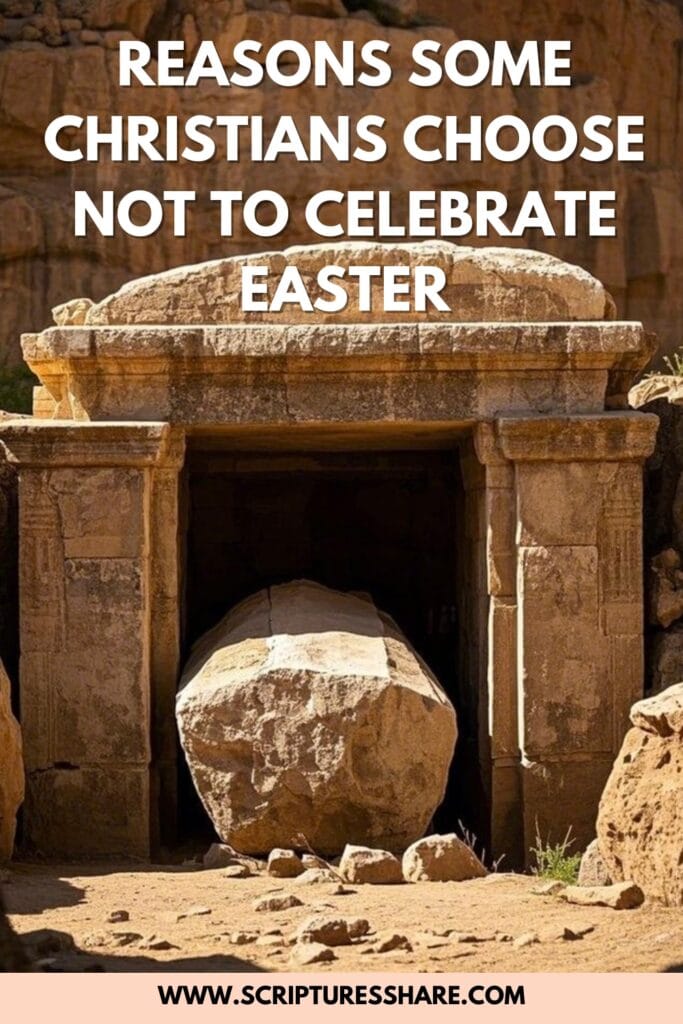No products in the cart.
Reasons Some Christian Choose Not to Celebrate Easter
This post contains paid and/or affiliate links. I make a small commission at no extra cost to you. Please see our Privacy Policy.
Easter is a big Christian holiday, celebrated by billions with eggs, church services, and family. But many Christian groups don’t celebrate Easter. They do this for reasons that go beyond just not wanting to celebrate.
These reasons include history, theology, and culture. By looking into these, we learn about different Christian groups and how faith changes over time and cultures.
This journey takes us from old church debates to today’s worship, showing why some find faith outside Easter.
Historical Foundations: The Complicated Origins of Easter
Pagan Roots and Christian Adaptation
The word “Easter” comes from “Ēostre,” a Germanic spring goddess. This shows how early Christians used old festivals to help people convert. This was a common way to spread Christianity.
Spring symbols like eggs and rabbits were added to Easter. This mix of old and new traditions is seen today. Some Christians see this as a problem, feeling it’s not true to their faith.
The Quartodeciman Controversy
Early Christians argued over how to celebrate Jesus’ resurrection. The Quartodeciman controversy was about whether to follow Passover or Sunday. The Council of Nicaea in 325 AD decided on Sunday, but questions remained.
Theological Objections to Easter Observance
Sola Scriptura and the Regulative Principle
Reformed churches follow the regulative principle, saying only what Scripture commands is right. They don’t celebrate Easter because it’s not directly mentioned in the New Testament. Instead, they focus on Sunday worship.
Concerns About Pagan Syncretism
Groups like Jehovah’s Witnesses and some Anabaptists see Easter as too pagan. They point to Jeremiah 10:2, saying we shouldn’t adopt non-biblical practices, even if they seem Christian.
Christ’s Resurrection as Perpetual Reality
For many, Jesus’ resurrection is not just a past event but a constant spiritual reality. Paul says in Romans 6:4 that believers live in “newness of life” every day through Christ. This view makes annual celebrations seem unnecessary.

Denominational Perspectives on Easter
Jehovah’s Witnesses: Rejecting “False” Holidays
The Watchtower says Easter and Christmas come from pagan worship and distract from true devotion. They don’t celebrate Jesus’ resurrection on a special day but remember his death on Nisan 14.
Quakers: The Everyday Sacred
Quakers believe every day is holy, not just special holidays. They think holy days lead to hypocrisy. Today, Quakers might acknowledge Easter but don’t celebrate it.
Some Reformed Baptists: Regulative Principle in Practice
Churches like Sovereign Grace follow the regulative principle closely. Pastor John Piper says they celebrate the resurrection every Sunday, not just on Easter.
This is because the New Testament doesn’t command Easter celebrations.
The Church of God (Seventh Day): Sabbath and Calendar Concerns
This denomination keeps the seventh-day Sabbath and follows biblical feast days. They reject traditional Christian holidays.
They say Easter replaces God’s appointed times with human traditions, as found in Leviticus 23.
Cultural and Practical Considerations
Regional Adaptations
In places where Christianity is new, some churches don’t celebrate Easter. They see it as a foreign tradition. Instead, they have their own ways to remember the resurrection that fit their culture.
Secularization Backlash
Easter is getting too commercial, with $18 billion spent on it in the U.S. alone. Some Christians choose not to celebrate to protest this. It’s similar to how some object to Christmas being too commercial.
Simplification Movements
Modern Christian minimalism wants to get rid of unnecessary traditions. For them, not celebrating Easter is a way to purify their faith. It’s about focusing on what’s truly important.
Alternative Observances
Passover Connections
Messianic Jews and some Protestants see a strong link between Passover and Christ. They might have seder meals with Christian meanings instead of Easter services.
Resurrection-Focused Lord’s Days
Churches that don’t celebrate Easter might focus on resurrection themes all year. They spread out the emphasis on worship throughout the year.
Personal Spiritual Practices
Some people don’t celebrate Easter but have their own spiritual practices. They might pray more, meditate on resurrection stories, or do acts of service during Holy Week.
Comparative Analysis: Easter vs. Other Christian Holidays
Easter and Christmas
Both are big holidays, but Christmas is more widely accepted. Here’s a comparison:
| Aspect | Easter | Christmas |
|---|---|---|
| Biblical Basis | Explicit resurrection accounts | Birth narratives in Matthew/Luke |
| Cultural Penetration | Primarily Christian | Nearly universal |
| Commercialization | Moderate (candy, apparel) | Extreme (gifts, decorations) |
| Denominational Acceptance | Nearly universal with exceptions | Nearly universal with exceptions |
Easter and Pentecost
Pentecost is less known but just as important for many Christians. It celebrates the Holy Spirit’s arrival. Some prefer Pentecost because it’s not tied to pagan traditions and is about the church’s start.
Psychological and Community Impacts
Identity Reinforcement
Not celebrating Easter can make a group’s identity stronger. Sociologist Nancy Ammerman says, “Religious boundaries are often maintained through deliberate differentiation in practice.”
Interfaith Considerations
Not celebrating Easter can help build bridges with non-Christian groups. It shows respect for their beliefs by not participating in all holidays.
Family Dynamics
Non-celebrating families create their own traditions. They might have Bible studies or service projects. Children in these families often feel just as spiritually fulfilled without Easter.
Addressing Common Misconceptions
Myth: Non-celebrants Deny the Resurrection
Reality: Everyone agrees on the resurrection’s importance. They just disagree on how to celebrate it.
Myth: This Is a Modern Phenomenon
Reality: The debate about Easter dates back to early Christianity. It’s been discussed in writings from the second century.
Myth: It’s About Being “Anti-Catholic”
Reality: While history plays a role, many object on biblical grounds. It’s not just about being against a particular denomination.
Conclusion: Unity in Diversity
The Christian world shows amazing flexibility in sharing core beliefs. From lively Easter services to quiet moments on Sunday, believers honor Christ’s victory in many ways.
This variety, when understood together, makes the global church stronger, not weaker.
When we meet Christians who celebrate Easter differently or not at all, we see something important. What truly brings us together is our faith in the risen Christ.
So, not celebrating Easter doesn’t mean rejecting the message of Christ’s victory.
It’s just another way to express the power of Christianity’s message.















